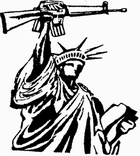Click Here to Puruse the old Flyover-press
Please Click ton Ab
Liberty knows no compromise
Click to Subscribe to Our Free Daily News Service
Donate today to help defray the costs of this important free newsletter
A Universal Ethic for All Mankind: A Detailed Review and Synopsis of The Ethics of Liberty
by Murray N. Rothbard
Chapter 15: “Human Rights” as Property Rights
Compiled and Edited
by
Dr. Jimmy T. (Gunny) LaBaume
There are no human rights which are not also property rights. In fact, “human rights” lose their absoluteness and clarity and become fuzzy and vulnerable when property rights are not used as the standard.
Property rights are identical with human rights in two senses: First, property can only accrue to humans. Second, a person's right to his own body and personal liberty is a property right in his own person. It is also a “human right.”
Take, for example, the “human right” of free speech. The question is: Where? He certainly has no such right on property where he is trespassing. So that only leaves his own property or the property of someone who has allowed him onto the premises. So again, there is no such thing as a separate “right to free speech.” There is only a man's property right.
Couching the analysis in terns of “free speech” actually weakens the concept of rights. A good example is Justice Holmes's contention that no one has the right to shout “Fire” falsely in a crowded theater. Thus, following that argument the right to freedom of speech is not (and cannot be) absolute. However, analyzing the problem in terms of property rights requires no weakening of the rights. One can not shout “Fire” in a crowded theater because that would be a violation of the property rights of the theater owner as well as those of the patrons who have paid to see the performance.
In the same manner, a person does not have “freedom of the press.” However, he does have the right to write and publish a pamphlet and sell or give it away. This is related to what is known as the “chairman's problem”—the problem of allocating time or space in an assembly hall or newspaper or in front of a microphone. The problem is much easier solved if the concept of rights is recast in terms of private property instead of “freedom of speech or assembly.”
In each of the above examples the scarce time or space is free. Thus we have a “ rationing problem.” We have a scarce resource that has to be allocated. However, the demand is bound to exceed the supply because it is free. Hence a perceived “shortage” develops.
In all cases, a scarce resource must be allocated by its owner whether by prices or some other means. For example, the chairman of an assembly could ask for bids. (This is essentially what producers do when they sell time to sponsors.) Also, a person who writes a letter to the editor of a newspaper is not the owner of the paper. Only the owner of the paper has the absolute right to grant or to deny publication of the letter.
A person who hires a hall and convinces people to collect there where he addresses his “congregation” is not exercising some vague “right of free speech.” This is simply a part of his general right of property.
Problems where rights seem to require weakening arise where the locus of ownership is not precisely defined—e.g. where property rights are muddled. Government-owned streets offer a good example. Government, like any other property owner, is faced with the problem of how to allocate its scarce resources. Since a political “march” will block traffic, the decision involves the allocation of street space.
The problem would not arise if the streets were privately owned. In that case, they could be rented by or donated by the owner for the purpose of assembly. The only right would be the property right to use one's money to rent the resource provided the owner is willing. As long as the streets continue to be government-owned, the conflict will remain insoluble. If the government allows the street march, it will restrict traffic. If it disallows the march, it will block the freedom of access to the streets. In either case the “rights” of some taxpayers will be curtailed.
Who owns government assemblies? Since no one really knows, there is no satisfactory (non-arbitrary) way to decide who gets to speak and who does not. The man who demands to be heard at a town meeting claims to be a part owner. However, he has not established any sort of property right through purchase, inheritance, or discovery.
To return to the streets for example, there are currently pressures by residents to prevent McDonald's from opening in their area. This seems to be a clear of McDonald's property rights. But the residents point is the litter and the attraction of “undesirable” elements who gather in on the streets in front. So, what they are really complaining about is the “bad” use of the government streets and not so much McDonald's property right. If the streets were privately owned, the entire conflict could be resolved without violating anyone's property rights. The owners of the streets would simply decide who has access.
Those street-owners who limit access would pay the price in the form of the actual costs of policing as well as the loss of business to the merchants and the diminished flow of visitors to their homes. Thus, the free society would result a diverse pattern of access—some streets (neighborhoods) would be open to all and others would have varying degrees of restricted access.
Furthermore, the private ownership of all streets would resolve the problem of the “human right” to freedom of immigration. There is no human right to immigrate. No one has a “right” to trample on anyone else's property without his permission. Some property owners may not want the immigrant on their property. On the other hand, other owners might jump at the chance to rent or sell property to an immigrant. So, the entire “immigration question” can be resolved within the matrix of absolute property rights. People only have the right to move to those properties and lands where the owners are willing to rent or sell to them. One has the right to travel only on those streets whose owners agree to have them there. So once again, a diverse pattern of migration would arise in the free society.
Continue to the next chapter...
*Note: We hold no special government issued licenses or permits. We don't accept government subsidies, bailouts, low-cost loans, insurance, or other privileges. We don't lobby for laws that hurt our competitors. We actively oppose protectionism and invite all foreign competitors to try to under price us. We do not lobby for tariffs, quotas, or anti-dumping laws. We do not support the government's budget deficits: we hold no government or agency securities.
To Subscribe to our daily e-mail alert service, send an e-mail with the word "subscribe" on the subject line.
Visit Our Advertisers
Email for Advertising Rates
Use the link or send an email to: adinfo@flyover-press.com

